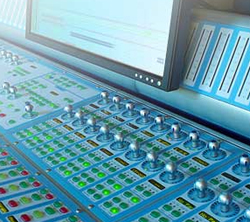
A bit later, Harrison, which manufactured the Show Console for Showco, would offer a version for sale at about $500,000 – a bit much to pay for a thing that’s going to bounce around in a truck most of the time.
But the Show Console became very popular with Showco, and after the merger, with Clair Brothers. Still, the execution racks wouldn’t travel too well, and cards had to be re-seated when the console got to a show. Also, the rotary encoders on the surface would sometimes catch fire, although they would still work afterward.
Various people I knew in the industry were claiming to have been flown to Japan, taken into a small room and made to play around on some kind of prototype digital mixer.
Having done this, they were required to come up with suggestions for improvements, promise to speak with no one regarding this matter and were put on a plane home.
Yamaha was working on something big and digital, and they took their time with it. When they finally finished, we had the PM1D. I was lucky enough to be at the first training seminar given on the “1D,” which was attended by all of the Yamaha dealers who were going to distribute the product.
We were shown a product that had been well laid out, with an easily understandable work surface, configurable input and output hardware, 96 inputs and 48 outputs (need more now please), great internal dynamics and effects, all at a price range that was affordable.
The digital console had come of age, and would be the only piece of equipment I would need at front of house apart from a CD player (and still is, to this day).
We used the PM1D at the Grammy Awards show the following year. Instead of having to constantly reset consoles by hand, as in the past, I could now hit recall and announce to the rest of the audio crew who hadn’t even began to strike the last band that I was ready to line check the next one.
If I still smoked, I would have had time for a cigarette outside the venue and still be back in plenty of time for the next line check. Life was good.
Unfortunately I no longer smoke, so I ended up having to listen to award acceptance speeches, which are mind numbingly boring at best.
So here we are, in the present day, the PM1D has been “retired” by Yamaha after a trailblazing decade in our industry, and there are many great large- and small-format from a slew of manufacturers. The digital console train has taken me for a heck of a ride to this point.
And it’s fascinating to think of where it will end up.
Based in Los Angeles, Fletch is noted as a top mixer for high-profile shows and corporate events.

